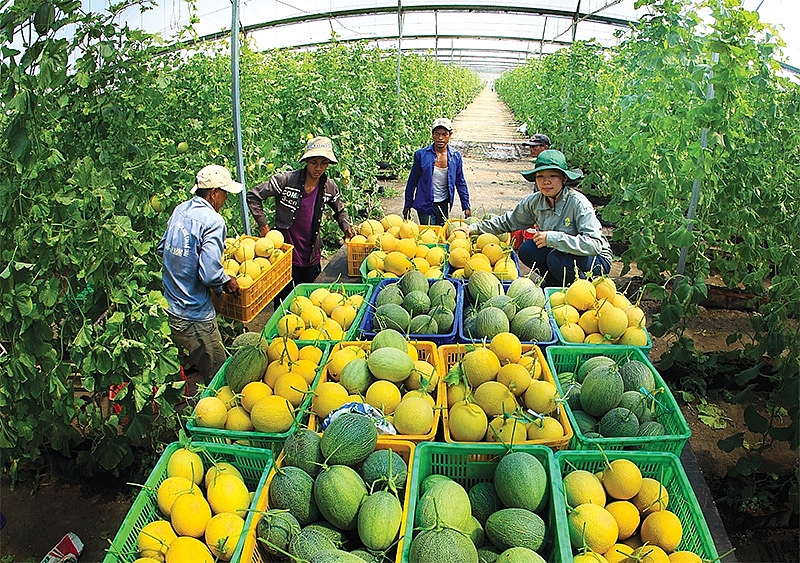Economic bailout package proposed
 |
| Export of fruit and vegetables have been particularly hampered in recent weeks, Photo: Le Toan |
Past support packages from the government- In 2009, in order to prevent economic slowdown, Vietnam announced fiscal and monetary packages to stimulate the economy. At that time, the government stated that stimulus packages in Vietnam had reached $8 billion, accounting for about 12 per cent of GDP in 2008. The stimulus packages were welcomed by businesses who were struggling with the recession. Meanwhile, economists said this move was the right decision to push economic growth. The government used a reported $1 billion to subsidise 4 per cent of lending interest loans for enterprises within eight months and another interest rate subsidy for medium- and long-term loans within 24 months. Besides that, the government announced credit guarantees for export activities, buying machinery and equipment that served production activities. The stimulus also included tax-cutting measures. To boost investment demand in Vietnam, the government additionally mobilised around $3.4 billion from governmental bonds to invest into infrastructure projects. - In 2012 the government approved a bailout package worth an estimated VND29 trillion ($1.26 billion) in a bid to rescue struggling companies who suffered from a shortage of outlets for their products, and restricted access to bank loans due to high lending rates. Specifically, a 30 per cent corporate tax cut was given to small- and medium-sized enterprises, excluding financial, insurance, and lottery companies, together with producers of items imposed with special consumption tax. - In 2013, the government extended a bailout package reported to amount to VND30 trillion ($1.3 billion) to support the domestic property market. The SBV asked five banks that participated in the programme – Agribank, BIDV, VietinBank, Vietcombank, and Mekong Delta Housing Development Bank – to offer loans to low-income earners in order to buy homes and businesses to quicken the pace. |
Deputy Minister of Planning and Investment Tran Quoc Phuong said that his ministry (MPI) last week proposed that the government enact a bailout including two solution groups to help the economy out of woes resulting from the novel coronavirus, or nCoV, outbreak.
“The first solution group will be prioritised into deploying measures to combat and prevent the epidemic, because now is the time we need to mobilise resources for controlling the outbreak,” Phuong said.
“Right after the virus is reined in, the MPI will propose the second solution group, which will be focused on carrying out measures to overcome losses and damages caused and to help people and enterprises to recover production and business.”
According to Phuong, it is also important that the government calculates its financial and technical resources, and determines who will need support.
“For example, many farmers producing agricultural items such as dragon fruit and watermelons are suffering from the epidemic as they cannot export their products,” he said, adding that there will also be other solutions such as speeding up the disbursement of public investment.
“Localities need to soon complete all necessary procedures for projects to become operational, helping spur on economic growth,” he said.
Commenting on the upcoming bailout for enterprises during and after the outbreak, Nguyen Minh Cuong, principal country economist from the Asian Development Bank, told VIR that it is quite necessary for the government to provide fiscal support for people now. However, it is also important that the nature of the support package is defined.
“Boosting the implementation and disbursement of large-scale state-funded projects is a kind of support,” said Cuong. “Applying a stimulus package is also another kind of support – this package may include tax reduction and exemption, and debt payment rescheduling. This solution is very important as many firms have used bank loans to import goods, but now import activities have been halted, badly affecting them.”
The government previously applied some bailouts in the past to help people and enterprises out of difficulties in past years (see box).
However, according to Cuong, a huge stimulus package like that seen in 2009 is not required right now, “but it is quite necessary for the MPI and the Ministry of Finance to combine to boost the disbursement of big state-funded projects, and for the State Bank of Vietnam to restructure debts for debtors. That’s what people and businesses need the most.”
Currently, China and Thailand have launched their support packages for enterprises suffering from the nCoV, said Deputy Minister of Industry and Trade Tran Quoc Khanh.
“China’s central bank has applied a reduction of lending rates for enterprises. Meanwhile, Thailand has had a plan to implement an overall programme on urgent support for its travel firms via preferential loans and delay in paying corporate income tax, as well as a reduction in special consumption tax for aircraft fuel and in airport charges,” Khanh said.
| Luu Quang Khanh - General director National Center for Socio-Economic Information and Forecast
Due to the impacts of novel coronavirus, or nCoV, the decline of China and the global economy, and the trading disruption between Vietnam and China, GDP growth of the country could reduce 0.5 per cent this year. This will force a decrease of 1.2 per cent in the first quarter, 0.44 per cent in the second, and 0.1 per cent in the third and fourth quarter. The impact will be more serious if the epidemic lasts for a long time and the Chinese economy continues to decline in the next quarter, which could reduce GDP growth of the country by 0.7 per cent. Across the world, the economic outlook is not too negative thanks to such motivation as the progress of US-China negotiations, the decrease of the price in goods, loosened monetary policies from central banks, the recovery of emerging economies, and the recovery of global foreign direct investment (after dropping since 2018, when a lot of investors poured money into the US due to the sharp decline of the corporate income tax). However, the outbreak of nCoV in China and the spread to other countries has significantly impacted the global economy, which is forecast to decrease in the first quarter or even the first two quarters of 2020. The Chinese economy is projected to suffer a huge loss, and decline by 1.5-2 per cent of growth in this quarter, leading to a drop in the world’s economic growth, especially for economies with close trading and investing relationships with China such as Singapore, South Korea, and Vietnam. At the end of 2019 before the outbreak was reported, we predicted that GDP could grow by 7.01 per cent, which was the average scenario. However, the nCoV epidemic has negatively affected Vietnam’s economy, which is opening widely. We forecast that such industries as agriculture, textile and garments, leather and footwear, electronics and computers, tourism, catering, and wholesale and retail will suffer the most negative impacts, because China is both supplier of materials and an exporting market. However, the forecast of decreasing by 0.5 per cent point of GDP growth does not include the response of the economy and the assistance of the government in order to prevent the epidemic spreading, and recovery of the economy after the outbreak. In fact, the impacts of the nCoV epidemic to Vietnam’s economy depend on numerous factors like the length of time and solutions to preventing the epidemic and recover the economy. At present, the Vietnamese government is doing its utmost to control and prevent the spread of the virus, and the prime minister is determined to reach the targets set forth. Therefore, the Ministry of Planning and Investment in general, and the NCIF in particular are researching to find out the best solutions to minimise the negative impacts of nCoV and recover the economy as soon as possible. Do Thi Ngoc - Head, Department of Pricing Statistics, General Statistics Office
Currently, trade activities between Vietnam and China have halted, so the goods flow from China into Vietnam is limited. However, goods imported from Japan, South Korea, and Thailand, along with domestically-produced goods, can replace those from China. The coronavirus epidemic has also halted Vietnam’s goods, especially vegetables and fruit, from entering China, so the goods must be consumed domestically. This has increased supplies, and contributed to reducing the climb of the CPI. In 2020, the weather continues to be unpredictable. Meanwhile, US-Iran relations and the Middle East situation remain in tension. Thus, many international financial institutions have forecast that the oil price this year will still be very high, at $64-65 per barrel. In the local market, there will be many factors increasing prices, such as a basic monthly pay rise from VND1.49 to 1.6 million ($65-70). The price of healthcare and educational services will also be increased under the government’s roadmap. Moreover, the price of pork remains high now due to African swine fever. Now, the country’s total pig herd has dropped 13.8 per cent, while it often takes three or four months to recover the herd. Thus to keep the CPI at below 4 per cent this year, the pork price must be controlled effectively. |
What the stars mean:
★ Poor ★ ★ Promising ★★★ Good ★★★★ Very good ★★★★★ Exceptional
Related Contents
Latest News
More News
- Foreign leaders extend congratulations to Party General Secretary To Lam (January 25, 2026 | 10:01)
- 14th National Party Congress wraps up with success (January 25, 2026 | 09:49)
- Congratulations from VFF Central Committee's int’l partners to 14th National Party Congress (January 25, 2026 | 09:46)
- 14th Party Central Committee unanimously elects To Lam as General Secretary (January 23, 2026 | 16:22)
- Worldwide congratulations underscore confidence in Vietnam’s 14th Party Congress (January 23, 2026 | 09:02)
- Political parties, organisations, int’l friends send congratulations to 14th National Party Congress (January 22, 2026 | 09:33)
- Press release on second working day of 14th National Party Congress (January 22, 2026 | 09:19)
- 14th National Party Congress: Japanese media highlight Vietnam’s growth targets (January 21, 2026 | 09:46)
- 14th National Party Congress: Driving force for Vietnam to continue renewal, innovation, breakthroughs (January 21, 2026 | 09:42)
- Vietnam remains spiritual support for progressive forces: Colombian party leader (January 21, 2026 | 08:00)



 Tag:
Tag:




















 Mobile Version
Mobile Version